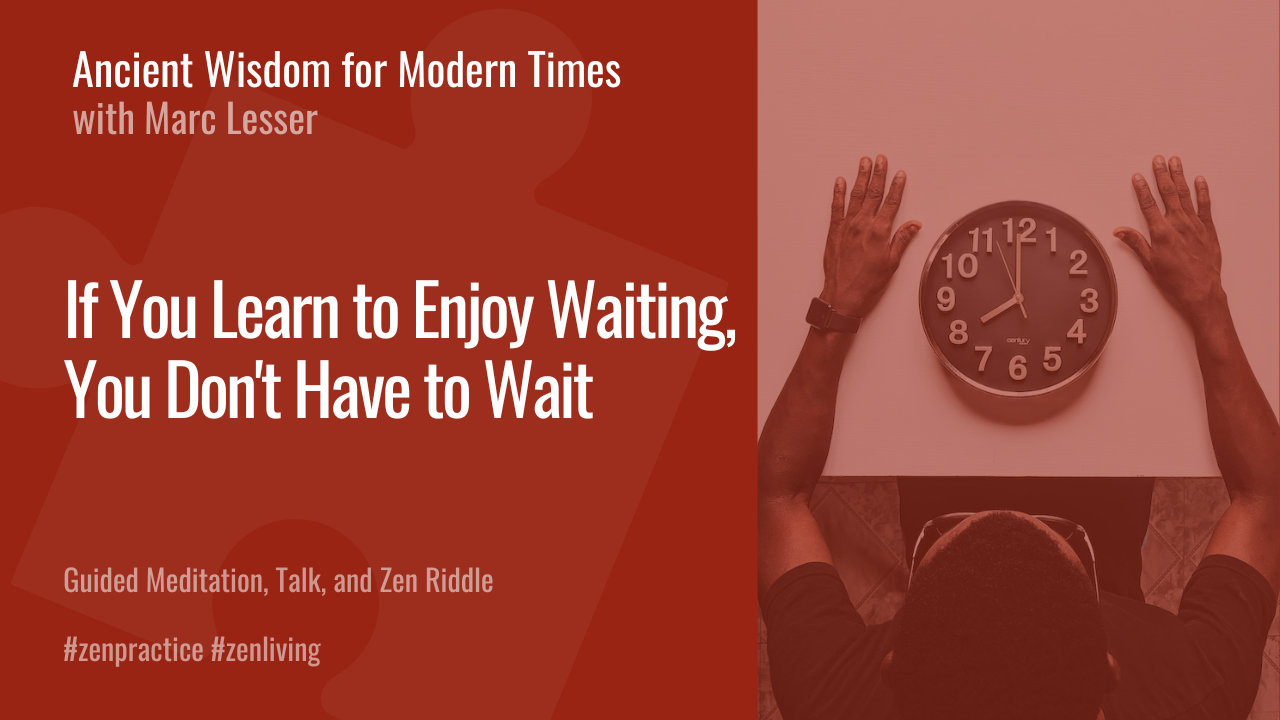In this practice episode, Marc guides us through a series of exercises that encourage us to be more present in the moment. He leads a brief meditation focused on releasing our expectations, then shares some insights on the expression: “If you learn to enjoy waiting, you don’t have to wait to enjoy.” This lighthearted and practical approach can help us let go of frustrations and anxieties, allowing us to appreciate each moment of our lives.
Marc also presents a Zen puzzler that delves into the meaning behind a short saying from Shunryu Suzuki: “no gaining ideas.” Through this riddle, he invites us to contemplate what it would be like to live with a sense of everything we need. Ultimately, the answer lies in embracing a radical acceptance of our lives. By doing so, we can cultivate a deeper appreciation for the present moment and all that it has to offer.
EPISODE TRANSCRIPT
Marc Lesser: Welcome to Zen Bones. Ancient wisdom for modern times. This is Marc Lesser. Why Zen Bones? Our world is in crisis and ever shifting, and now more than ever, more wisdom, clarity, and courage are essential, especially in the world of work, business, and leadership.
In today’s episode, we begin with a short-guided meditation, with an emphasis on letting go of expectations. Then I do a short talk on the expression, “If you learn to enjoy waiting, you don’t have to wait to enjoy.” This is a lighthearted and practical way to shift from frustration and anxiety, to letting go of expectations, and enjoying and appreciating each moment of our lives, even when things are not going our way.
Today’s Zen puzzler is a short expression from Suzuki Roshi that he uses quite a bit. No gaining idea. What would it be like to live our lives without a sense of something missing, with no gain, with a radical acceptance of our lives? Radical acceptance of each moment. I hope you enjoy this episode.
[music]
Now, let’s begin with some sitting practice. This simple practice of stopping and arriving. Perhaps noticing the transition from activity or whatever you may have been doing to pausing, bringing attention to being here, noticing the body, noticing the breath, and with approach of warmhearted curiosity as much as possible, but checking in with whatever you are feeling, sensations in the body, whatever mood, feelings, approach. No need to change anything, but just tuning in and noticing.
I’m particularly noticing the breath. This breath is new and fresh. This breath that has never happened before, and won’t again. Simple every day and sacred at the same time. This experience; what is it like to be here right now? What is it like to be alive and with this sense of nothing? No need to change anything and nothing to accomplish of what relief, needing to get anything done.
[pause 00:04:43]
Appreciating and enjoying this moment, this life, and this breath, and keeping it simple. Breathing in, breathing out.
[pause 00:05:19]
Maybe checking in with what is in your heart right now. Deepest feelings, intentions, you being curious about what’s underneath the surface, the surface of your awareness and letting it bubble up. Being curious in warmhearted curiosity.
[pause 00:06:10]
Bringing what I think of as our best self, best biggest minds, biggest hearts to this practice of just stopping, just pausing. [silence] I’m going to transition. I’m going to ring a bell. Feel free to stop, or feel free to pause and continue sitting, if you like, at your own pace.
[pause 00:07:06]
[music]
If you learn to enjoy waiting, you don’t have to wait to enjoy. I’ve always loved this expression. Actually, first heard it from my good friend, Kaz Tanahashi, who is a Zen teacher, calligrapher, translator, one of the premier Zen translators, especially of Dogan, the 13th century mystic. If you learn to enjoy waiting, you don’t have to wait to enjoy. I find I use this often when I’m stuck in traffic, or in a line at the grocery store, or I’m in a meeting room and waiting for other people to arrive. It’s a great expression if you are maybe at a restaurant and you’ve placed an order, and you’re waiting, or meeting a partner or a friend who is running late.
Many, many situations, and most of us, I’ve noticed generally, we don’t like to wait. It can be frustrating, annoying. We experience waiting as a waste of time keeping us from getting to the real stuff. We generally don’t plan on waiting. It’s not part of the plan. It’s rarely or maybe never expected or scheduled, and because of that, there’s some gap and there’s some frustration or anxiety, or anger. At times it can even get mixed with a hearty dose of blame. Maybe blaming ourselves. We weren’t clear enough, or blaming others for this interruption or loss of momentum.
I find that, in some way, it’s a route entering whatever’s happening. This is where I think, in some way, our meditation practice can be a great training ground for shifting our relationship with time, shifting our relationship with expectations. There’s an expression that Shunryu Suzuki, the author of Zen Mind, Beginner’s Mind, throughout his talks and throughout the book, he says “No gaining idea. No gaining idea.” I think underneath this expression is this sense that we often have that there’s something missing.
No gaining idea presents the possibility that there’s nothing missing. That there are no gaps. That everything is just as it should be, letting go of our expectations. This, I think, is a core, a meditation practice with every breath, noticing expectation, wanting to be somewhere else or wanting to be someone else. This radical sense of acceptance of ourselves, acceptance of our situation, acceptance of what is. You have this simple, somewhat lighthearted phrase, turns waiting on its head.
It suggests quite simply and directly that we have the ability to see, feel, and respond differently when faced with a situation where things don’t move at the pace where we might want. Instead, we see that frustration or anxiety are somewhat of a choice. That this is our habit energy coming into play. This phrase, “If you learn to enjoy waiting, you don’t have to wait to enjoy,” highlights the obvious and yet profound insight that there are events and there are interpretation of these events, that our responses don’t have to be automatic.
We actually have the power to interpret and respond to waiting in whatever way we wish. Instead of feeling irritated, we can see it as a time to enjoy the spaciousness that a timeout can provide. What a radical and liberating idea. Again, trying it on when stuck in traffic or waiting on the grocery line, waiting at a meeting, whatever it is, using this as a practice. Stepping into this space of transforming frustration to enjoyment or maybe even not getting frustrated in the first place.
This takes some practice, but we get lots of practice, I think with many, many occasions in daily life for waiting. What is it we’re waiting for? The more we practice this, I think the better we get at enjoying the little things, enjoying the moments, enjoying the spaces in between. Again, meditation, I think, is the ultimate radical practice of waiting. Waiting, just sitting, enjoying each moment, letting go of expecting anything. Yes. Remember, if you can learn to enjoy waiting, you don’t have to wait to enjoy.
[music]
Welcome to the Zen Bones puzzler, where I will regularly be presenting a story or a Zen con, or a poem, something to contemplate, to think about. A story that has a purpose. It’s about developing greater insight and reflection, not so much for a solution, but as a way to support your practice, a meditation in daily life.
[music]
For today’s Zen Puzzler or Zen koan, I want to use this expression that I’ve mentioned from Shunryu Suzuki, no gaining idea. No gaining idea. Let’s stay with this and work on this phrase. The idea for these– the idea for Zen koans, the idea for this, what I’m calling lightheartedly Zen Puzzler are phrases or ideas that we can practice with that can support us and help us in our daily lives. Yes, no gaining idea.
I think we are ordinary. Our everyday lives are filled with watching the clock and trying to be on time, and getting things done, and constantly noticing what’s missing, living in the ordinary world. However, we are not just ordinary human beings we are also, mysterious, poetic spiritual beings. It’s in this realm that there’s nothing missing, nothing lacking, nothing to gain, no gaining idea. I think this is the world that Shunryu Suzuki is pointing to with this expression.
He’s often uses the expression, “Don’t be a board-carrying person,” this image of a carpenter or anyone carrying a large, wide board on their shoulder and missing out on the world, on the other side of the board. I think what he’s saying is that don’t forget about the sacred poetic world, the world outside of the gain. To me, what’s fascinating is how these two worlds can actually support each other. Of course, they’re not actually two worlds. It helps, I think, if we are only living in the ordinary world, to get a glimpse of this more sacred world, this world of no gaining idea.
More and more to see how by letting go of gaining ideas, letting go of the ordinary world, and seeing the world as a sacred and poetic, and mysterious, it can shift and support how we show up in the ordinary world. It allows us to have a sense of more spaciousness, acceptance, and to see the mystery in everything, whether it’s in doing the laundry or writing an email, or having a conversation with our friend or loved one. Everything is both ordinary and extraordinary. Everything is both everyday ordinary and poetic, and mysterious at the same time. Yes, that’s how I think of this expression, “No gaining idea.”
I also think of Shunryu Suzuki’s words where he says the purpose of our lives is to cross the shore from confusion to clarity, from the sense of something lacking, to seeing that everything is perfect just as it is, just as we are. Then he goes on to say, “But the secret is that we cross the shore with every step, with every breath we take.” He’s playing, I think, with this idea of the ordinary world, and the mysterious and spiritual world, extraordinary world.
You might experiment with this koan, this Zen Puzzler. Maybe write it down, maybe do some journal writing. What does it mean, “No gaining idea”? How does it show up? How doesn’t it show up? No gaining idea. Try it on. Thank you.
[music]
Listen in each week for interviews, teachings, and guided meditations. You’ll receive supportive tools for creating more meaningful work and mindfulness practices to develop yourself, to influence your organization, and to help change the world. Thank you for listening.
[music]
[00:19:59] [END OF AUDIO]








